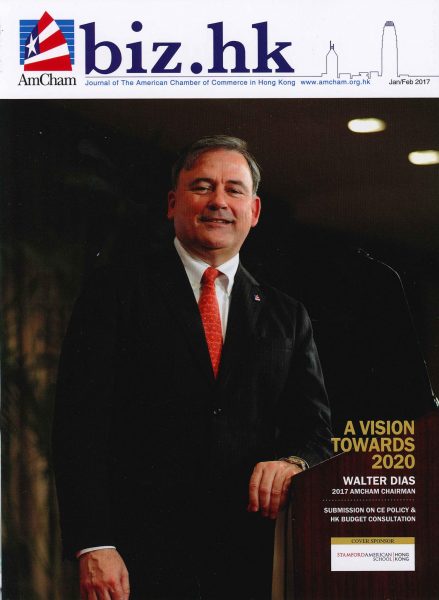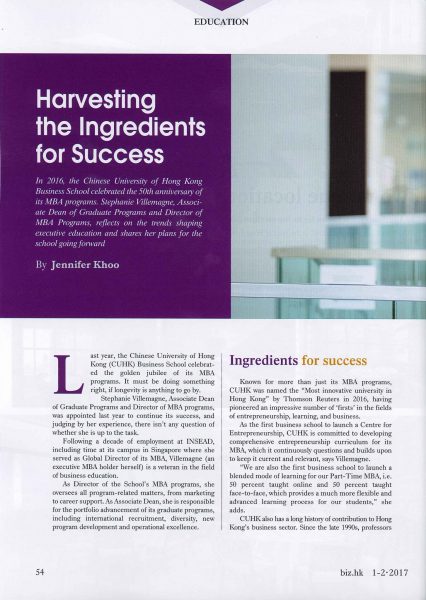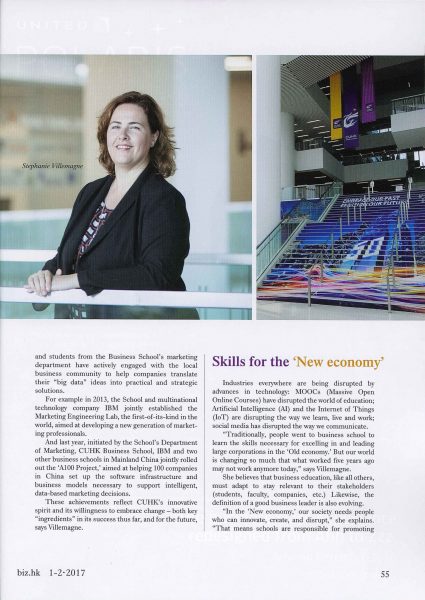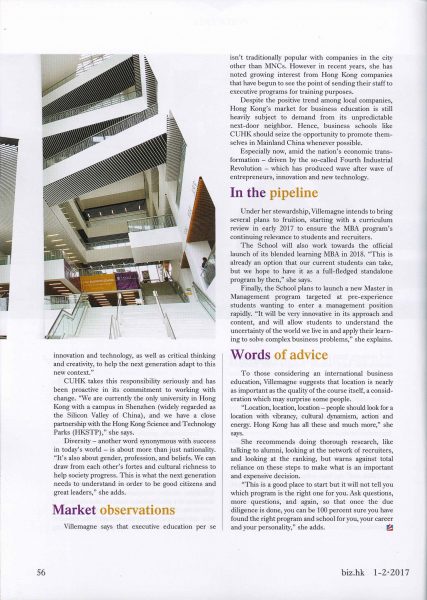Harvesting the Ingredients for Success
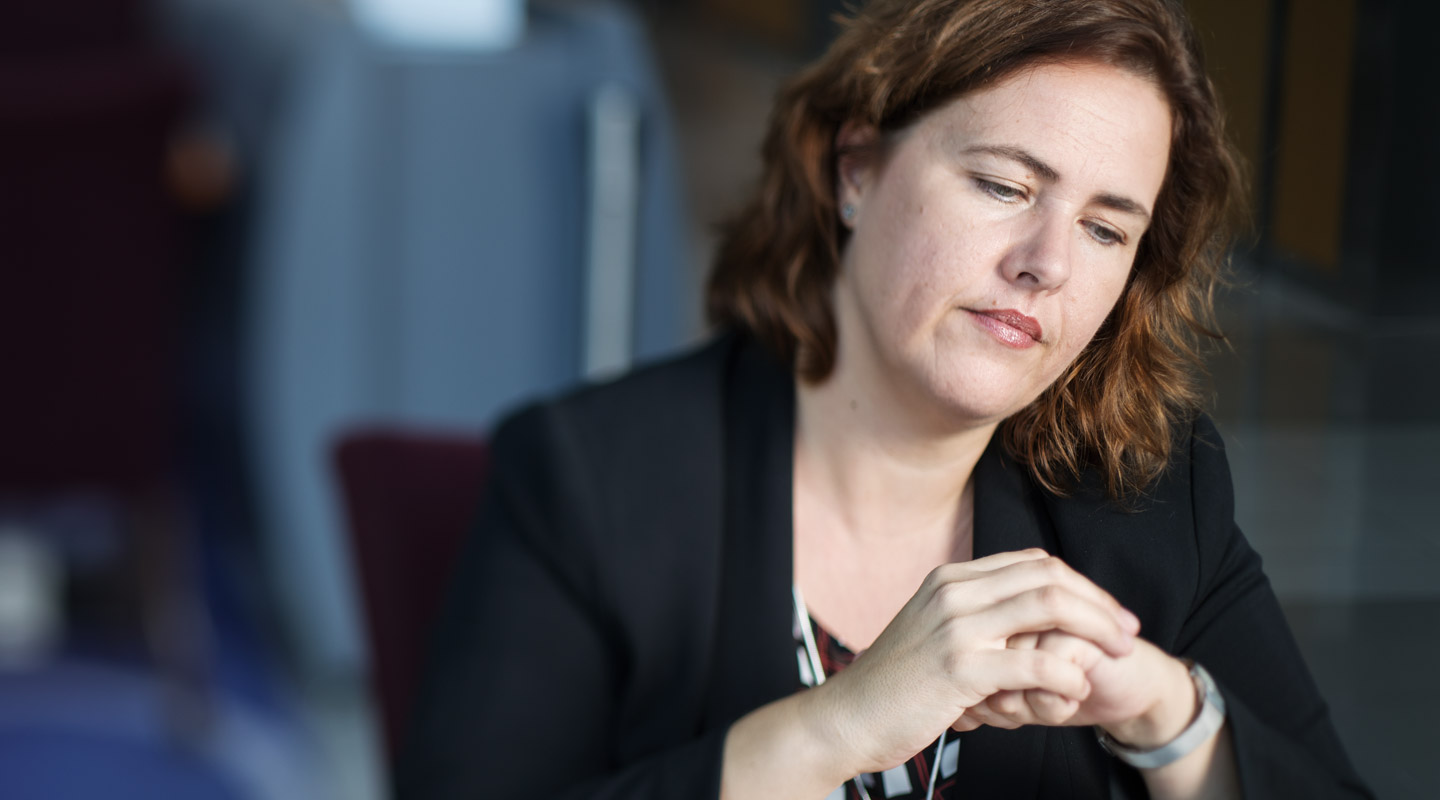
In an interview with biz.hk, journal of AmCham, Stephanie Villemagne says that business education, like all others, must adapt to stay relevant to their stakeholders (students, faculty, companies, etc.).
In 2016, The Chinese University of Hong Kong (CUHK) Business School celebrated the 50th anniversary of its MBA programs. Stephanie Villemagne, Associate Dean (Graduate Programmes) and Director of MBA Programmes at CUHK Business School, reflects on the trends shaping executive education and shares her plans for the School going forward in an interview with biz.hk, journal of The American Chamber of Commerce (AmCham) in Hong Kong.
Known for more than just its MBA programmes, CUHK was named the ‘Most innovative university in Hong Kong’ by Thomson Reuters in 2016, having pioneered an impressive number of ‘firsts’ in the fields of entrepreneurship, learning, and business.
As the first business school to launch a Centre for Entrepreneurship, CUHK is committed to developing comprehensive entrepreneurship curriculum for its MBA, which it continuously questions and builds upon to keep it current and relevant, says Villemagne.
“We are also the first business school to launch a blended mode of learning for our Part Time MBA, i.e. 50 percent taught online and 50 percent taught face-to-face, which provides a much more flexible and advanced learning process for our students,” she adds.
Industries everywhere are being disrupted by advances in technology: MOOCs (Massive Open Online Courses) have disrupted the world of education; Artificial Intelligence (AI) and the Internet of Things (IoT) are disrupting the way we learn, live and work; social media has disrupted the way we communicate.
Villemagne believes that business education, like all others, must adapt to stay relevant to their stakeholders (students, faculty, companies, etc.) Likewise, the definition of a good business leader is also evolving. “In the ‘New economy,’ our society needs people who can innovate, create, and disrupt,” she explains. “That means schools are responsible for promoting innovation and technology, as well as critical thinking and creativity, to help the next generation adapt to this new context.”
Under her stewardship, Villemagne intends to bring several plans to fruition, starting with a curriculum review in early 2017 to ensure the MBA program’s continuing relevance to students and recruiters.
The School will also work towards the official launch of its blended learning MBA in 2018. “This is already an option that our current students can take but we hope to have it as a full-fledged standalone programme by then,” she says.
Finally, the School plans to launch a new Master in Management programme targeted at pre-experience students wanting to enter a management position rapidly. “It will be very innovative in its approach and content, and will allow students to understand the uncertainty of the world we live in and apply their learning to solve complex business problems,” she explains.
To those considering an international business education, Villemagne suggests that location is nearly as important as the quality of the course itself, a consideration which may surprise some people.
“Location, location, location – people should look for a location with vibrancy, cultural dynamism, action and energy. Hong Kong has all these and much more,” she says… Read More
The interview article has been featured in the cover story published in both the print and online editions of the January/February 2017 issue of biz.hk. Please click the images below to view the print coverage.
Source: biz.hk, journal of AmCham HK
Date published: 2 February, 2017
Photo: Keith Hiro


